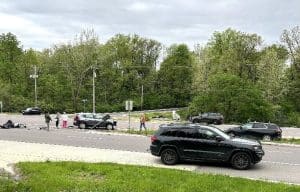Columbia biz goes international

If you have been through airport security in America, there is a good chance you have experienced the results of a business that came to Columbia last year.
That business is PPCT Human Factor Science, located at 216 W. Sand Bank Road.
Its owner and CEO, Bruce Siddle, got a contract after the Sept. 11, 2001 terrorists attacks to train approximately 250,000 Transportation Security Administration agents to screen passengers.
“That was a wonderful operation,” Siddle recalled. “It was very consuming for three years of our lives. It was a great learning experience.”
Siddle, a Millstadt resident, may be familiar to Monroe County residents.
Before working in private practice, Siddle worked in law enforcement, including for roughly 10 years as a deputy with the Monroe County’s Sheriff’s Department.
It was during that time that Siddle realized how much he loved this area.
“I just fell in love with the county,” Siddle said.
In the 1980s, Siddle began the training and research that would become PPCT Management Systems.
He started in an assistant-style role in regional training academies, beginning with helping in firearms training.
“I got very interested in use of force training,” Siddle said.
The training component of his business now focuses on instructing those who work in various fields like law enforcement, intelligence, and hospital security.
Siddle, who is a member of the Black Belt Hall of Fame, has trained people from all five branches of the military, the Bureau of Alcohol, Tobacco, Firearms and Explosives and local law enforcement agencies on use of force tactics and other subjects like survivals stress.
Siddle said about 90 percent of police academies nationwide use his training or research. He has also trained at police academies in other countries including Canada, England, China, Brazil and Mexico.
In addition, PPCT Human Factor Science has trained over 69,000 instructors during its history, who have then gone on to train more than 400,000 individuals in law enforcement and the armed forces.
One of the company’s most significant training contracts, however, was the one with the TSA.
For that contract, Siddle and the around 1,000 people who worked for him trained people at over 400 airports worldwide while updating the White House on their progress daily.
“We were very close to the Bush Administration,” he noted.
In terms of that research, Siddle, an international authority on high risk and precision human factors, has focused on human factor science, which he said is similar to performance psychology and studies human performance in high-risk, high-stress situations.
“The human factor business is something I’m passionate about. I just love the study of it and always have because the human is the x-factor,” Siddle said.
As part of his research, Siddle has written numerous academic papers on topics like stress and performance, conducted research on those subjects, and testified as an expert witness in court.
One example of his initial research is he found that, in high-stress situations, your brain releases a hormone that inhibits your ability to remember the details of what happened.
Those hormones then dissipate after about three days, which is why Siddle said you may see a police officer remember different details of a shooting after some time has passed.
More recently, Siddle explained that he has been researching tiny, nonverbal signals that show what a person is about to do.
For instance, he has developed a training program centered on the movements of a person’s eyebrows as an indicator of their actions.
“We can tell what a person’s mindset is just by looking at their eyebrows,” Siddle said.
Those movements can take a third of a second or less, and Siddle said he can teach individuals to recognize and respond to them in about 45 minutes.
“We try to keep everything simple,” he said. “If you can’t teach it fast, you can’t do it fast.”
In addition to using that research in the ways described above, Siddle also creates training manuals that he updates every five years.
“Our company today has a huge publishing business,” Siddle said.
It may surprise readers to know that a business with such an immense impact is, as of last January, located in Columbia after being in Millstadt for 12 years.
Siddle moved his company to its current to be able to provide more in-house training.
He will now look to continue his success in the town he has wanted to have an office in for years, but he has already accomplished remarkable feats.
“I’ve had a great career,” Siddle reflected.






